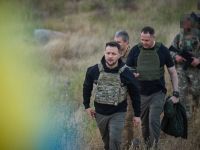Chief UN weapons inspector Hans Blix said on Monday Iraq had refused to allow reconnaissance flights by U2 aircraft over its territory to aid inspectors in their search for any weapons of mass destruction.
"We've not had Iraqi agreement on flying the U2 planes that we wanted. They put up a number of conditions that were not acceptable to us," Blix told reporters on his arrival in Athens from a two day visit to Baghdad.
Blix said while he and Mohamed ElBaradei, head of the UN nuclear watchdog, won some pledges of better Iraqi cooperation in searching for any weapons of mass destruction, not all issues were solved.
On his part, US Secretary of State Colin Powell said Monday the United Nations cannot be scared into "impotence" in dealing with Iraq's refusal to cooperate with UN weapons inspectors and failure to disarm.
"We cannot be shocked into impotence because we are afraid of the difficult choices that are ahead of us," Powell told the UN Security Council.
"However difficult the road ahead may be with respect to Iraq, we must not shrink from the need to travel down that road," he said.
"Hopefully there will be a peaceful solution, but if Iraq does not come into full compliance, we must not shrink from the responsibilities that we set before ourselves when we adopted 1441 on a unanimous basis," Powell said.
"If Iraq is not disarming, the United Nations cannot turn away from its responsibilities," Powell said. "Iraq has a responsibility now to avoid a conflict, to avoid a war," he said.
Earlier, German Foreign Joschka Fischer said Berlin could not support the use of force in Iraq because of fears it could destabilize the Middle East and hamper the global war on terrorism.
"We are greatly concerned that a military strike against the regime in Baghdad would involve considerable and unpredictable risks for the global fight against terrorism," Fischer said.
"We have no illusions about the brutal nature of Saddam Hussein's regime, therefore we all demand that Baghdad implement then relevant UN resolutions in full and without any exceptions," he said.
"However, in addition to disastrous consequences for long-term regional stability, we also fear possible negative repercussions for the joint fight against terrorism," Fischer conveyed. "These are fundamental reasons for our rejection of military action."
Separately, US Secretary of Defense Donald H. Rumsfeld dismissed suggestions that U.N. weapons inspectors would need months of additional time to determine whether Iraq is meeting its obligation to disarm.
"The burden of proof is on Iraq to prove that it is disarming," Rumsfeld said in a speech to a Reserve Officers Association conference. "Thus far they have been unwilling to do so."
In Washington, White House spokesman Ari Fleischer on Monday dismissed reports that Iraq was now encouraging Iraqi scientists to take part in interviews with U.N. inspectors. "We're only interested in action after 11 and 12 years of watching Saddam Hussein give his word and not keeping it," Fleischer said. (Albawaba.com)
© 2003 Al Bawaba (www.albawaba.com)







